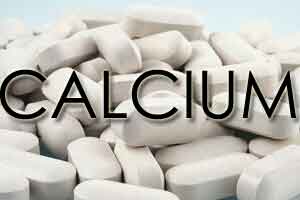- Home
- Editorial
- News
- Practice Guidelines
- Anesthesiology Guidelines
- Cancer Guidelines
- Cardiac Sciences Guidelines
- Critical Care Guidelines
- Dentistry Guidelines
- Dermatology Guidelines
- Diabetes and Endo Guidelines
- Diagnostics Guidelines
- ENT Guidelines
- Featured Practice Guidelines
- Gastroenterology Guidelines
- Geriatrics Guidelines
- Medicine Guidelines
- Nephrology Guidelines
- Neurosciences Guidelines
- Obs and Gynae Guidelines
- Ophthalmology Guidelines
- Orthopaedics Guidelines
- Paediatrics Guidelines
- Psychiatry Guidelines
- Pulmonology Guidelines
- Radiology Guidelines
- Surgery Guidelines
- Urology Guidelines
Calcium supplements may increase CVD and stroke risk

China: A recent study has found calcium supplements to be associated with an increased CHD (coronary heart disease) risk, especially myocardial infarction. The study, published in the Journal of the American College of Nutrition, further found that dietary calcium intake, however, does not adequately increase the risk of CVD including CHD and stroke.
Calcium is a macromineral that plays many critical biological roles, especially in bone physiology and the cardiovascular (CV) system. The Institute of Medicine (IOM) and the National Institutes of Health (NIH) recommend a daily calcium intake of 1200 mg to 1500 mg for women as well as men older than 65 years.
Several cohort studies have demonstrated calcium to be associated with beneficial cardiovascular effects. In contrast, many studies have questioned the beneficial effects of calcium intake and shown it to be associated with increased mortality or the risk of stroke and myocardial infarction, especially those taking calcium supplements (CSs).
The literature has identified several systematic reviews on the topic, but none have synthesized both observational studies and trials. Chao Yang, Southeast University, Nanjing, China, and colleagues aimed to synthesize both trial and observational studies and undertake a meta-analysis to explore the associations between calcium from dietary and supplemental intakes and cardiovascular disease risks.
The researchers searched online databases published from inception dates up to March 2019 and included randomized controlled trials (RCTs) and prospective cohort studies with data on dietary or supplemental intake of calcium, with or without vitamin D, and cardiovascular outcomes. Of the 1,212 identified studies, 26 prospective cohort studies and 16 RCTs were included.
Key findings of the study include:
- Results of cohort studies revealed that dietary calcium intakes (DCIs) ranging from 200 to 1500 mg/d did not affect the risk of CVD, CHD, and stroke (relative risk (RR) RR for CVD = 0.96, RR for CHD = 0.98, RR for stroke = 0.94).
- Pooled RR of RCTs showed that the risk of CHD due to calcium supplements increased 8% (RR = 1.08) and increased 20% allocated to CSs alone (RR = 1.20).
- CSs increased the risk of myocardial infarction (MI) by 14% (RR = 1.14), and CSs alone increased the MI risk 21% (RR = 1.21).
"Our results provide support for public health recommendations on encouraging residents to take calcium from dietary food. Extra CSs may bring potential CHD risk, especially MI," concluded the authors. "Thus, intake recommendations for calcium should consider individual characteristics and should focus on people with low intake levels of calcium, rather than increasing the intake of those with adequate amounts of calcium. The intake dosage of CS should be less than 1000 mg/d, and combining vitamin D supplementation may avoid the harmful effects of CS alone."
More Information: "The Evidence and Controversy Between Dietary Calcium Intake and Calcium Supplementation and the Risk of Cardiovascular Disease: A Systematic Review and Meta-Analysis of Cohort Studies and Randomized Controlled Trials" published in the Journal of the American College of Nutrition.
DOI: https://doi.org/10.1080/07315724.2019.1649219
Journal Information: Journal of the American College of Nutrition

Disclaimer: This site is primarily intended for healthcare professionals. Any content/information on this website does not replace the advice of medical and/or health professionals and should not be construed as medical/diagnostic advice/endorsement or prescription. Use of this site is subject to our terms of use, privacy policy, advertisement policy. © 2020 Minerva Medical Treatment Pvt Ltd